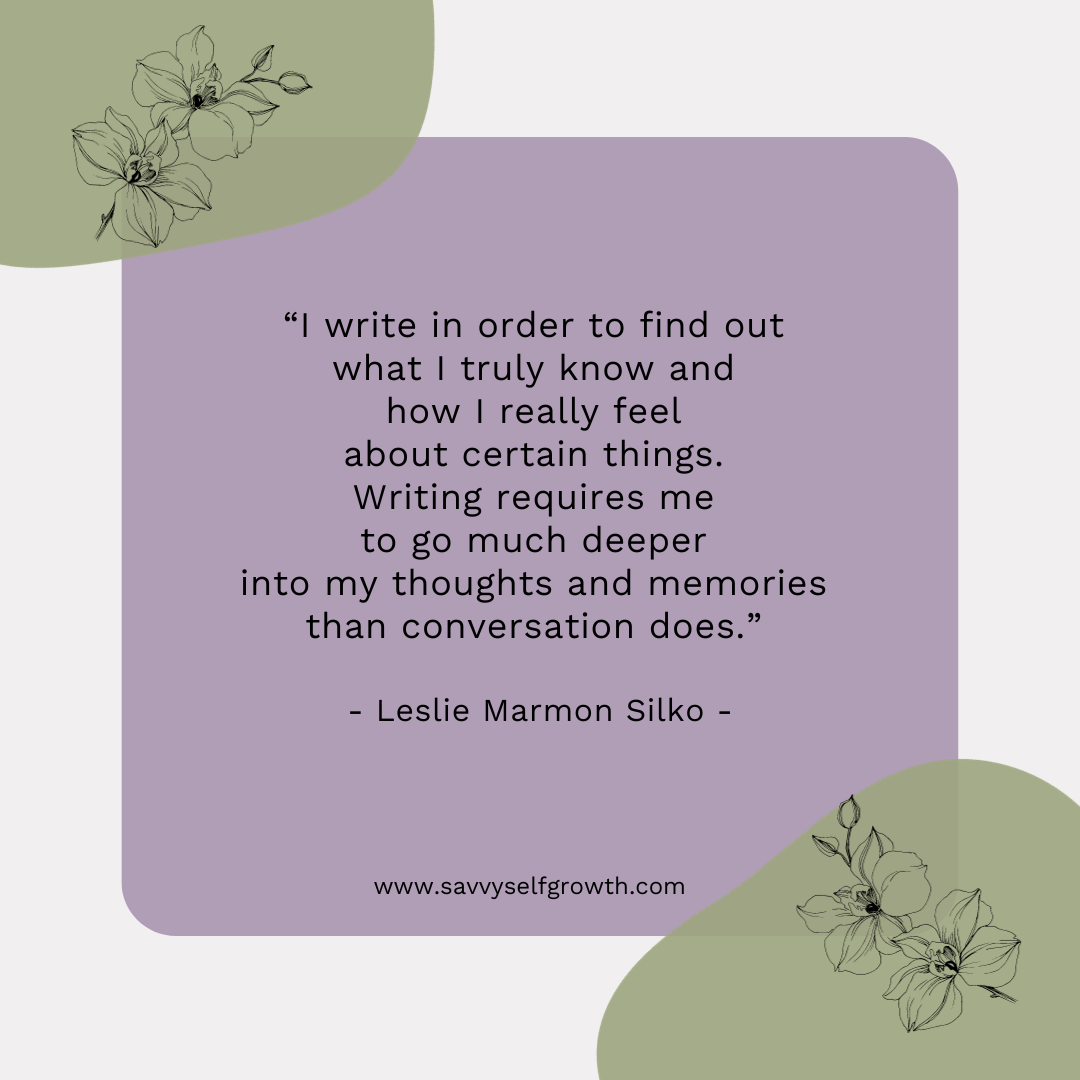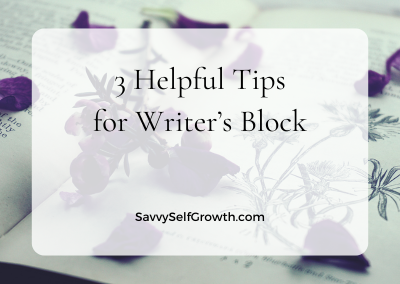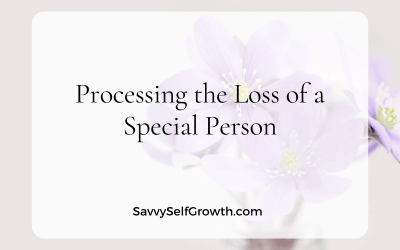I write in order to find out what I truly know and how I really feel about certain things. Writing requires me to go much deeper into my thoughts and memories than conversation does.”
~ Leslie Marmon Silko ~

As I sat down to write this article, I had what some might call ‘Writer’s Block’. I had the topic in mind, but I suddenly couldn’t think where to start, how to end, or what to put in the middle.
You might not know that I face this issue every Monday when I sit down to write for my newsletter.
Maybe it’s helpful for you to read what I do to gain traction.
What I learned from public speaking training
I’m reminded of a class many years ago that had me nauseous with anxiety. I had just started working as a computer programmer in 1998. The software house required of all their newbie programmers to go on an 8 week ‘public speaking’ course. We would all need skills to speak to our clients, gather software requirements and have useful conversations about their businesses.
Every Monday morning for 8 weeks, I got up with that feeling of ‘Boy, it was that day’ again. Every week we had to prepare a little talk about a topic in different styles. Ugh, the nerves. I barely knew how to program and now I had to learn to speak in front of new colleagues!
The most difficult week was the ‘unprepared speech’ one. We’d get a topic, have one minute to prepare, and then we’d have to go up there in front of everyone and have something intelligent to say.
My brain just doesn’t work that way! I have the ‘Intellection’ (2 min clip) talent in CliftonStrengths, which means thinking through things in multiple layers before we’re able to express. We call it the ‘inward processing’ talent. Most introverts have this one.
The most useful tip from that training
The most useful tip Derek Lomas had for us: just start speaking.
Have a few almost fluffy ways ready to start any topic. Just start ‘waffling’. Say the topic and use a filler like “So as I started thinking about this topic, I was reminded of…. “
As you speak, thoughts will come. The most important point is to start talking. Eventually I did learn to be able to just start — talking nonsense for a minute, and yes — it usually led to a more interesting thought.
It works for writing too
And this is the point I want to make here, today. I had absolutely no idea what to write in this article. So I just started where I was: with a thought about ‘Oh my goodness, I have this very problem that I want to write about, right this minute.’ And once I started with that thought, more thoughts came and then I remembered dear old Derek Lomas.
I got the prize for the most hard-working student of the course! Not the best speaker — but the one who improved the most. It was useful, though hard.
Derek’s advice often works for me with writing, too. I just start writing a few thoughts, even if I delete them later. And once I’ve started, other thoughts join them and eventually it’s a merry writing party.
But what if you sit down to write and there’s absolutely nothing that comes up for you to say?
I’ve been there, too. I do get it. Then the pressure builds, desperation sets in (especially if you have a deadline!) and your brain can’t think even a little bit.
We are less able to think clearly when we’re stressed. Our prefrontal cortex (where plans, goals and logical thinking) happens, shuts down when we feel intense or charged emotion. Most of the blood flow goes to the midbrain where the amygdala is king, and sets us off into fight/flight/freeze mode. We’re not designed to think well when we feel unsafe!
3 Tips for Writer’s Block
When you must write something and you just can’t think of anything to say, try these few tips. The main thing is that you bring yourself out of the stressed state.
1. Go for a short walk
Even 10–15 minutes can help. Repetitive motion (like walking, running, swimming) can help calm the brain. It’s been proven to relieve anxiety.
My best ideas for articles usually come to me on walks. I always have a note keeping app handy (like Google Keep, OneNote, ToDoIst) so I can jot down brief notes, or I record a short voice note that I can play back at home to store my ideas. This has worked for me countless times!
2. A few rounds of EFT tapping can work miracles
Yes, I keep harping on this — because it absolutely works! EFT tapping relieves the stress, by calming the amygdala in the midbrain. When that is calmer, our front brain can think again and bring us ideas and clarity.
Only a few minutes of tapping can help tremendously. Try any of these ways. By the way, these are not formal terms in the EFT world, they’re just my names for ways I use tapping.
(a). Silent Tapping
No words necessary here. Focus on your discomfort about writing, and any stressful thoughts about it. Simply start tapping, round after round, noticing where you experience sensations, where your thoughts are traveling, and keep tapping.
Usually for me, after 5 minutes or so, I pause, and notice how I feel and think. And then I’m often ready to tackle the task, almost like magic. Maybe it takes 10 minutes of tapping for you, and not 5. That’s perfectly okay, too. We’re all different.
(b). Mind Map Tapping
If you’re a more visual person, draw a mindmap with all your worries, concerns and thoughts about writing. Be honest with yourself. Then use each branch you’ve drawn and tap a few points about that branch. Work your way through the whole mind map. I’ve experienced so many times that by the end of this, my ideas are flowing and I feel inspired and ready to write. Plus, my stress levels in general have dropped a few notches. It’s so useful.
(c). List Tapping
If you don’t like drawing (artists’ block? 😜) then just write a simple list of all your thoughts and concerns at that point (whether about writing or not). Tap through each point of the list, in the same way as above. It’s really quite remarkable how quickly this can work. Each new bothersome thought, you can jot down at the end of the list, and make sure to cover that with a few tapping points, too.
Here’s an example of a list that I made up as I went. These are all thoughts that are lurking underneath the surface for most of us.
- I don’t know what to write
- I’m useless at this
- What’s the point — no-one will even read it
- Someone will think my writing is awful
- It feels utterly vulnerable to put my thoughts on paper
- Who am I to write about this topic?
- So many others have written about it and theirs are already so brilliant
- Add your thoughts…
Start jotting down your list… it’s amazing how they can start tumbling out once you given voice to one or two.
Then, start at the top and tap through each of the EFT points, naming each of the above thoughts (bullet points) as you go. You can stay on one tapping point for a while, and really tune in to that issue. Or, you can tap through an entire round (all the points) for one issue. There is really no right or wrong here.
It may take a bit of experimentation if you haven’t used EFT a lot. I will put out a few videos for writers’ block in the next few weeks, so keep tabs on my Youtube account to find them as they come out.
3. Do a vagus nerve exercise
Our vagus nerve is the longest nerve in the body — the ‘wandering’ nerve. It goes all the way from the base of the brain, wandering to all the internal organs, and runs parallel to the spinal chord. When it is activated, it brings us into the parasympathetic state — the rest and digest state. In this state, we’re relaxed, our brain can think, and our body-mind can recharge and heal.
Here is one you can try. If you want more, I compiled a free pdf with more. Feel free to reply and ask!
So here we are. I’ve written a whole article on Writer’s Block and all I did was start with “Guess what — I’m experiencing this thing I want to write about.”
Could you imagine this working for you?
An analogy for life
We don’t have to know the end before we make a start. Nor do we have to know exactly where the journey of writing (or life) will take us. It’s not necessary to feel inspired, or even motivated before we start, nor do we have to know exactly what points to make.
I’ve had the experience so often that I write down a few bullets I want to include. By the end of writing, I didn’t even refer to those bullets — and wrote about something else entirely.
Sometimes, our planning can be a way to get us started. It doesn’t mean we have to follow the plan we made. What if the Universe is leading us in a different way, and it needed us to start by making the plan?
One thing important thing I’ve learned from Steve Wells (creator of Intention Tapping) is this:
When we can be present with what is, we can almost always cope with it. But our thoughts and emotions about the past, and our projections and fears about the future take us away from the present moment. It’s only in the present moment that we can do or change something. So the more we can bring ourselves into the present, the more (gentle) power we have access to.
And the best way I know of to calm the influences from the past and future, is to use EFT tapping to let go of those stresses.
Reflection Questions for you:
- What is your best way to stay in the present moment?
- How do you overcome writer’s block?




